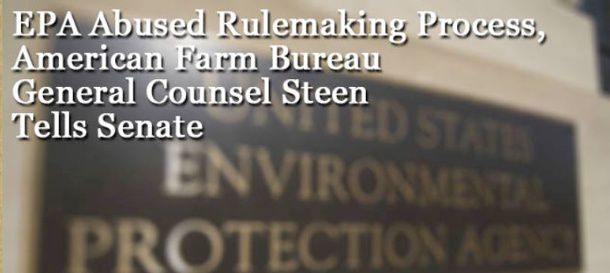EPA Abused Rulemaking Process, AFBF General Counsel Steen Tells Senate
Published
6/11/2015
By Julie Murphree, Arizona Farm Bureau: The EPA abused and distorted the normal rulemaking process to pre-determine the outcome of its highly controversial “Waters of the U.S.” rule, American Farm Bureau Federation (AFBF) General Counsel Ellen Steen told the Senate Judiciary Committee yesterday. In the meantime, AFBF also released documents outlining how the EPA’s Waters of the U.S. rule will give the agency sweeping powers to regulate land use despite a body of law clearly prohibiting such overreach.

Instead of inviting and openly considering public input, the EPA conducted an aggressive advocacy campaign to obscure the on-the-ground impact of the rule and to smear groups, like Farm Bureau, that dared to explain those impacts to the public, Steen told the committee.
“The notice-and-comment procedure for rulemaking is designed to ensure that agencies take
The agency also made use of new social media tools such as “Thunderclap” to gin up well-intended but ill-informed support for the rule among the lay public. Later, agency officials pointed to the resulting emails, petition signatures, postcards and other non-substantive mass comments to contend that “the public” supported the rule, even though the vast majority of substantive comments—by state and local governments, business owners, and organizations representing virtually every segment of the U.S. economy—opposed the rule.
“Regardless of whether you supported, opposed, or never heard of that rule, you should shudder to think that this is how controversial regulations will be developed in the age of social media,” Steen said. “Agencies must strive to maintain an open mind throughout the rulemaking process—and to inform rather than indoctrinate and obfuscate—even when policy issues have become controversial and politicized.”
In Arizona, First Vice President for Arizona Farm Bureau Stefanie Smallhouse shares similar concerns. "The whole purpose of this rule making was to provide clarification to landowners so that we can follow the law," said Smallhouse. "The final rule is more vague and contradictory than the proposed rule which is hard to believe. The only clarity provided in this whole process has been that the EPA gave no
In the meantime, Alarmed by the agency’s actions, the House of Representatives recently voted to prohibit the EPA from enacting the rule. A similar bill is moving through the Senate and could come to a floor vote within weeks.
The controversial WOTUS rule gives federal agencies new powers to regulate many normal farming,
The Federal Water Quality Protection Act, S. 1140, would force EPA and U.S. Army Corps of Engineers to scrap its own, extreme interpretation of the Clean Water Act and return to the drawing board, this time to craft a new rule that would fall within the parameters of Congress’ intent. The EPA and Army Corps would be required to take into consideration the valid concerns of farmers, ranchers, home builders and others who would be affected by the new rule.
“Thousands of farmers,
The measure would require a comment period on the revised proposed rule of no fewer than 120 days and a final rule published no later than Dec. 31, 2016.
“We thank Chairman Inhofe and all the other committee members who voted for this legislation,” Stallman said. “We also urge the Senate to pass this measure soon. The sooner Congress acts, the sooner the agencies can re-craft a rule that more accurately reflects the will of Congress and respects the concerns of all affected parties.”
The Farm Bureau analysis, now available online, makes available to the public details the EPA has refused to address in public meetings over the past year. The documents are available as PDF attachments.
“Our analysis shows yet again how unwise, extreme and unlawful this rule is,” American Farm Bureau Federation President Bob Stallman said. “Our public affairs specialists and legal team have assembled the best analysis available anywhere, and their conclusions are sobering: Despite months of comments and innumerable complaints, the Waters of the U.S. proposal is even worse than before.”
The WOTUS rule, first released in draft form in
The full text of Ellen Steen’s testimony can be found here: http://www.fb.org/tmp/uploads/Steen_Senate_Judiciary_Testimony15-0610.pdf